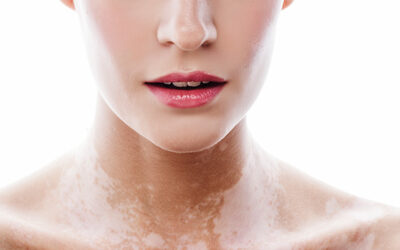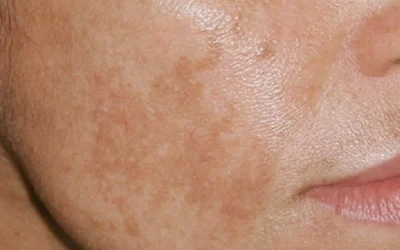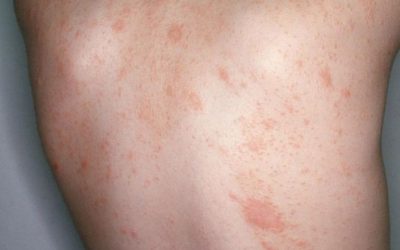Palmoplantar pustulosis
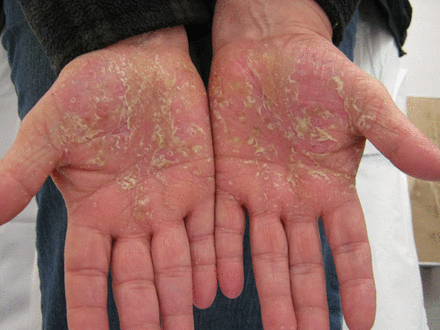
- It mostly occurs in women aged 40-69 and in smokers
- The manifestation of the disease is influenced by genetics, so it occurs more often in individuals whose relatives suffer from the disease
- Occurs more often in persons whose relatives and/or themselves suffer from psoriasis
- It can significantly worsen the quality of life, reduce working capacity
- The cause of the disease usually remains unknown
Risk factors
Although the exact cause of the disease is unknown, certain factors can lead to the development of this rare disease:
- smoking
- bacterial infections (chronic tonsillitis, sinusitis, dental infections)
- contact dermatitis (usually caused by metals)
- certain medications (biological therapy, other immunosuppressive drugs)
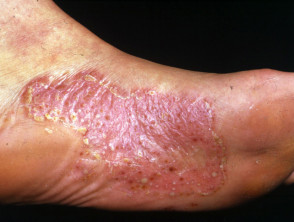
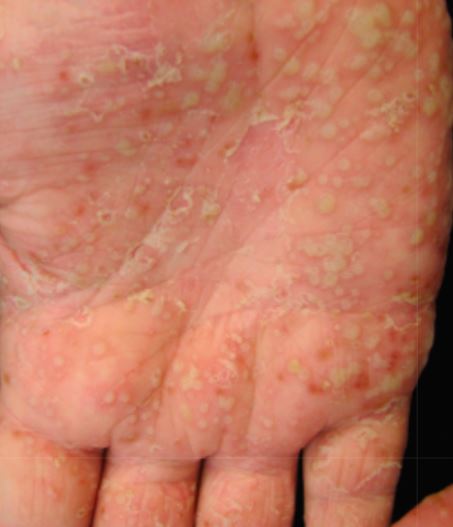
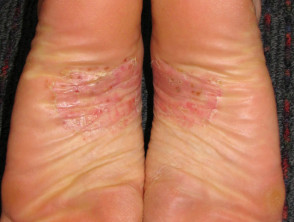
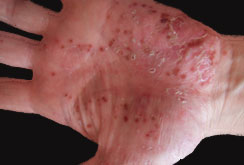
Palmoplantar pustulosis is characterized by:
- rash with regenerating vesicles filled with sterile fluid
- vesicles tend to merge into a red background
- after a few days, scaly, painful cracks appear
- itching, soreness, and a burning sensation are also characteristic
- localization: palms and soles
Diagnostics
Data from the patient’s interview and examination are usually sufficient to establish the diagnosis, in case of uncertainty, a smear can be taken from the vesicles to rule out a possible infection. In rare cases, a skin biopsy is performed.
Treatment
During the consultation, treatment is personalized for each patient. As there are no specific medications for this disease, a range of general treatment options may be considered:
- Topical treatments that help manage symptoms.
- Moisturizing creams and emollients.
- Medications that aid in skin renewal.
- Light-based therapy.
- A combination of skin renewal medications and light-based therapy.
- In more severe cases, where other methods are not effective, treatments that modulate the immune system might be used.
Prevention measures and useful tips
The following measures can help relieve the symptoms of Palmoplantar pustulosis and reduce the frequency of disease recurrence:
- quitting smoking
- skin protection from factors that cause contact dermatitis (avoiding a humid work environment, wearing gloves, using hygiene products intended for sensitive skin)
- avoiding stressful situations
- treatment of chronic infectious diseases (e.g., in case of chronic tonsillitis, consultation of an otorhinolaryngologist regarding the removal of tonsils)

Vitiligo – Why Do White Patches Appear on the Skin and How to Treat Them?
Vitiligo is a non-contagious skin condition characterized by white patches due to the loss of pigment. While it does not pose a direct threat to physical health, it can have a significant psychological impact. Learn what causes vitiligo, its symptoms, how it is diagnosed, and which treatment methods are currently available.
Hyperpigmentation: Causes, Types, and Modern Treatment Options
Hyperpigmentation is a common skin condition characterized by dark spots that appear due to sun exposure, hormonal changes, or skin damage. In this article, you will learn about the main types and causes of hyperpigmentation, as well as how to effectively treat it using modern dermatological methods and preventive care.
Pityriasis rosea
An acute, self-limiting, exanthematic skin disease that manifests as itchy, somewhat inflammatory, scaly rashes, usually on the torso, chest, and upper limbs.
iDerma
MB iDerma
Fabijoniškių g. 99, Vilnius
+370 670 70822
info@iderma.lt

